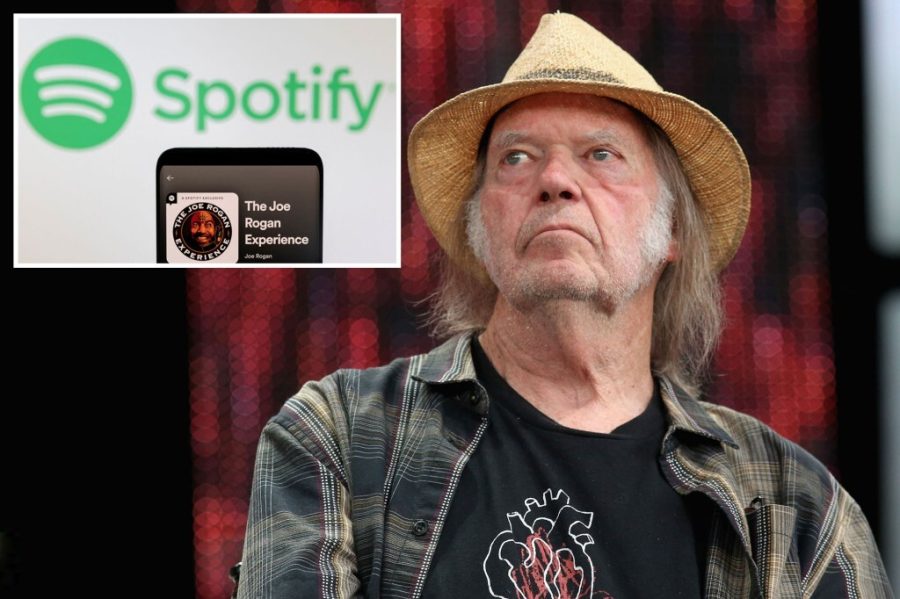Spotify Controversy Shows Money’s Influence
Last December, Joe Rogan had Dr. Robert Malone as a guest on his podcast, “The Joe Rogan Experience.” On the show, Malone proceeded to spread false information about the COVID-19 vaccines and compared the current situation to Nazi Germany. There was the typical outcry from the medical community, but this time, an unexpected challenger appeared: Neil Young called on Spotify to either remove his content or remove Rogan’s podcast. “They can have Rogan or Young. Not both,” he said.
Evidently, Spotify chose Rogan, and Young’s music disappeared from the streaming service. The only songs currently on his Spotify page are live performances, features and songs written for movie soundtracks. In the days since, multiple other artists have asked their music be removed in solidarity with Young.
In terms of the central controversy, neither party is blameless. Young’s assertion that Rogan’s listeners are “24 years old, impressionable and easy to swing to the wrong side of the truth” is also problematic. My generation is not a pawn passed off between musicians, podcasters and other internet celebrities. I am 21 years old, I am fully vaccinated and I am able to call out disinformation when I see it.
However, “The Joe Rogan Experience” fully deserves the criticism it’s receiving. Rogan is in the wrong for inviting an anti-vaccine advocate onto his show as a guest. The information peddled by anti-vaccine folks is inaccurate and ought to be called such. This rhetoric can be damaging, especially in the midst of a pandemic where vaccines offer critical protection. Criticism of “The Joe Rogan Experience” shouldn’t end with vaccine disinformation, either. In the days since Young’s ultimatum, new information has come to light about Rogan’s use of racial slurs.
As showdowns go, this is an odd one: an aging folk-rock musician calls out a divisive right-wing podcaster over vaccine disinformation on a music streaming service. This controversy deserves our attention as a classic case of free speech on the internet, but at its core, the real issue is money. While it can be worthwhile to consider how platforms handle disinformation, it is important to recognize that, at its core, those platforms do not see this as a moral issue.
This is easy to lose sight of when you pay $4.99 per month for your student plan, but Spotify is a multi-billion-dollar company. It does not exist for the benefit of promoting accurate information or for the sake of an individual vibing with their earbuds in; it exists to make money.
“The Joe Rogan Experience” helps Spotify do exactly that. It is Spotify’s most popular podcast, with around 11 million listeners each episode (consider that there were 14 episodes released last month). Prior to the controversy, Young had around 5.7 million listeners on Spotify each month. “The Joe Rogan Experience” far outstrips him in the number of listeners. More listeners means more revenue for Spotify. In light of these numbers, it’s hard to believe that Young thought he even had a chance in de-platforming Rogan.
Spotify also holds exclusive rights to “The Joe Rogan Experience,” which means every fan of the show needs a Spotify account to listen. The truth is that the podcast is Spotify’s cash cow, and the streaming company is reluctant to give up the steady stream of income.
It’s worth noting that Spotify has removed COVID-19 vaccine disinformation before. Since the pandemic began, the streaming platform has taken down “more than 20,000 podcast episodes related to COVID-19.” None of those episodes belong to “The Joe Rogan Experience.”
From the headlines, you may think that Spotify has come around; the platform will now have “content advisories” for podcasts that discuss COVID-19. However, this half-baked countermeasure was not the result of Spotify developing a moral compass: the company’s market value tanked by $4 billion last week. The “content advisory” is Spotify’s desperate attempt to save face as it tries to bring back investors and prevent subscription cancellations.
Truly, canceling your subscription is the only power you have over streaming companies. Your monthly $4.99 may not seem like much, but with Spotify’s millions of listeners, those subscriptions add up. Many users have threatened to delete Spotify if this issue is not resolved soon; perhaps a mass exodus could pressure Spotify to take action.
It’s unfortunate that our power is equivalent to our money, but it’s important to exercise the power we can.
Erica Weidner, FCRH ’22, is an English major from Phoenixville, P.A.

Erica Weidner is a junior at Fordham College at Rose Hill, majoring in English and double minoring in political science and philosophy, and for the last...













































































































































































































